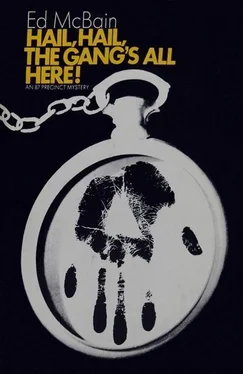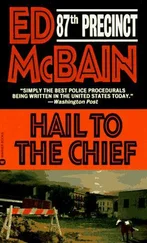“So what did you do, Lyons?”
“Argh, the fuckin’ little bastard started yelling. They... they busted me again.”
“Same charge?”
“Well, not the same ’cause the kid was older now. You know, like there’s carnal abuse with a kid ten years old or younger, and then there’s carnal abuse with a kid over ten and less than sixteen. He was eight years old the first time and eleven the next time. It was a bum rap both times. Who the hell needs that kind of stuff, you think I need it? Anyway, this was a long time ago. I already served both sentences. You think I’d be crazy enough to risk a third fall?”
“You could’ve been put away for life the second time,” Brown said.
“Don’t you think I know it? So why would I take another chance?” He looked up at Brogan. “That kid must’ve heard me wrong, Officer. I didn’t say nothing like that to him. Honest. I really didn’t.”
“We’re booking you for endangering the morals of a child, as defined in Section 483-a of the Penal Law,” Brown said. “You’re allowed three telephone—”
“Hey, hey, look,” Lyons said, “give me a break, will you? I didn’t mean no harm to the kid, I swear it. We were just sitting there talking, I swear to God. I never said nothing like that to him, would I say something like that to a little kid? Jesus, what do you take me for? Hey, come on, give me a break, will you? Come on, Officer, give me a break.”
“I’d advise you to get a lawyer,” Brown said. “You want to take him down, Brogan?”
“Hey, come on,” Lyons said.
Brown watched as the patrolman led Lyons out of the squadroom. He stared at the retreating figure, and thought, The guy’s sick. Why the hell are we sending him away again, instead of helping him? And then he thought, I have a seven-year-old daughter — and then he stopped thinking because everything seemed suddenly too complex, and the telephone on his desk was ringing.
He lifted the receiver.
It was Steve Carella reporting that he was on his way to the squadroom.
José Vicente Huerta was in a bad way. Both of his legs had been broken by the four assailants who’d attacked him, and his face was swathed in bandages that covered the multiple wounds that had spilled his blood all over the front stoop of the building. He resembled a not-so-invisible Invisible Man, his brown eyes burning fiercely through the holes left in the bandages.
His mouth, pink against the white, showed through another hole below the eyeholes, and looked like a gaping wound itself. He was conscious now, but the doctors advised Delgado that their patient was heavily sedated and might drift in and out of sleep as he talked. Delgado figured he would take his chances.
He sat in a chair by the side of Huerta’s bed. Huerta, both legs in traction, his hands lying on the covers, palms up, his head turned into the pillow in Delgado’s direction, the brown eyes burning fiercely, the wound of the mouth open and pathetically vulnerable, listened as Delgado identified himself, and then nodded when asked if he felt able to answer some questions.
“First,” Delgado said, “do you know who the men were?”
“No,” Huerta answered.
“You didn’t recognize any of them?”
“No.”
“Were they young men?”
“I don’t know.”
“You saw them as they attacked you, didn’t you?”
“Yes.”
“Well, how old would you say they were?”
“I don’t know.”
“Were they neighborhood men?”
“I don’t know.”
“Mr. Huerta, any information you can give us—”
“I don’t know who they were,” Huerta said.
“They hurt you very badly. Surely—”
The bandaged head turned away from Delgado, into the pillow.
“Mr. Huerta?”
Huerta did not answer.
“Mr. Huerta?”
Again, he did not answer. As had been promised by the doctors, he seemed to have drifted off into sleep. Delgado sighed and stood up. Since he was at Buenavista Hospital, anyway, and just so his visit shouldn’t be a total loss, he decided to stop in on Andy Parker to see how he was doing. Parker was doing about as well as Huerta. He, too, was asleep. The intern on the floor informed Delgado that Parker was out of danger.
Delgado seemed as thrilled by the information as Brown had earlier been.
The trouble with being a detective in any given neighborhood is that almost everybody in the neighborhood knows you’re a detective. Since detection is supposed to be undercover secret stuff at least some of the time, snooping around becomes a little difficult when 90 per cent of the people you encounter know you’re a snoop. The bartender at Bar Seventeen (which was the name of the bar in which the Marine had first encountered the girl who later kicked him in the head, such bar being thus imaginatively named since it was located on Seventeenth Street) knew that Carl Kapek was a bull, and Kapek knew that the bartender knew, and since they both knew, neither of them made any pretense of playing at cops and robbers. The bartender set up beers for Kapek, who was not supposed to drink on duty, and Kapek accepted them without offering payment, and everybody had a nice little understanding going. Kapek did not even attempt to ask the bartender about the kicking girl and her boyfriend. Nor did the bartender try to find out why Kapek was there. If he was there, he was there for a reason, and the bartender knew it, and Kapek knew he knew it, and so the two men kept a respectful distance, coming into contact only when the bartender refilled Kapek’s glass from time to time. It was a cool symbiosis. The bartender merely hoped that Kapek was not there investigating some minor violation that would inevitably cost him money. He was already paying off two guys from the fire department, not to mention the police sergeant on the beat; one more guy with his hand out, and it would be cheaper to take care of the goddamn violations instead. Kapek, for his part, merely hoped that the bartender would not indicate to too many of his early-afternoon patrons that the big blond guy sitting at the bar was a police detective. It was difficult enough these days to earn a living.
The way he decided to earn his living on this particular bright October Sunday — bright outside, dim and cheerless inside — was to engage a drunk in conversation. Kapek had been in the bar for close to an hour now, studying the patrons, trying to decide which of them were regulars, which of them came here infrequently, which of them recognized him from around the streets, which of them had not the faintest inkling that he was fuzz. He did all of this in what he hoped was a surreptitious manner, going to the phone booth once to pretend he was making a call, going to the men’s room once, going to the jukebox three or four times, casing everyone in the place on his various excursions, and then settling down on a stool within listening distance of the bartender and a man in a dark-blue suit. Kapek opened the Sunday tabloid he had carried with him into the bar, and turned to the sports section. He pretended to be pondering yesterday’s racing results, working figures with a pencil in the margin of the newspaper, while simultaneously listening intently to everything the man in the blue suit said. When the bartender walked off to serve someone at the other end of the bar, Kapek made his move.
“Damn horse never delivers when he’s supposed to,” he said.
“I beg your pardon?” the man in the blue suit said, turning on his stool. He was already very intoxicated, having presumably begun his serious drinking at home before the bar could legally open its doors. He looked at Kapek now with the benign expression of someone anxious to be friendly with anyone at all, even if he happened to be a cop. He did not seem to know that Kapek was a cop, nor was Kapek anxious to let him in on the secret.
Читать дальше












